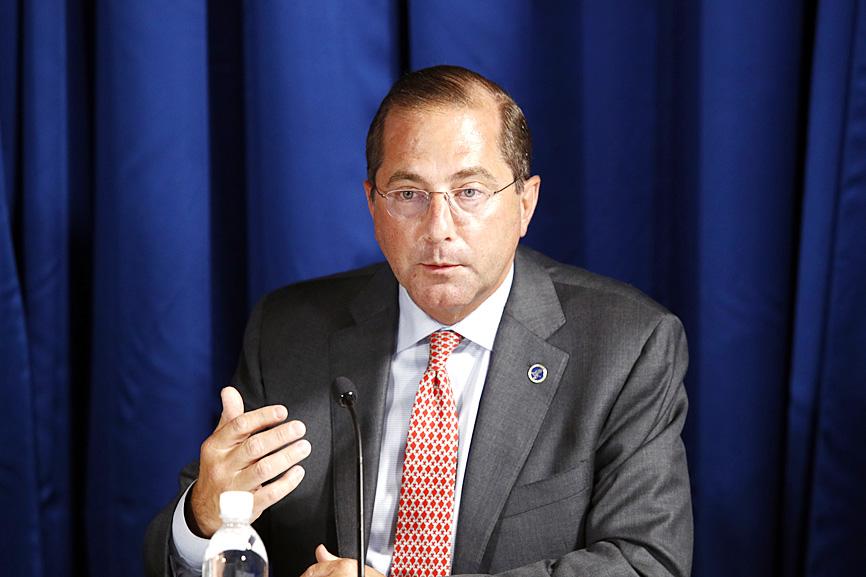US Secretary of Health and Human Services Alex Azar on Friday said he wants to learn about Taiwan’s “incredibly effective” response to COVID-19, even though the nation did things that the US has fumbled, such as having a unified strategy and citizens willing to wear masks.
Azar leads a US delegation arriving today for a three-day visit to Taiwan. They are to meet with President Tsai Ing-wen (蔡英文) and health system leaders, and Azar is to give a speech to public health graduates.
“The message of this trip is about Taiwan,” Azar said in an interview, deflecting a question about China. “It’s about public health, it’s about our partnership with Taiwan, but also the model that Taiwan offers to the world community of a transparent and open healthcare system. It is a model others can learn from.”

Photo: AP
The trip is a geopolitical chess move in Washington’s contentious relationship with China, which has voiced concerns about the trip to Washington and called on the US to stop government-to-government interactions with Taiwan.
Azar called Taiwan’s coronavirus response “incredibly effective” and said that he is willing to “learn from them about their responses.”
It is not too late for the US, said a leading expert on Taiwan’s healthcare system, Cheng Tsung-mei (鄭宗美), a Princeton University health policy research analyst.
“It will be good if our health chief can learn from Taiwan, how exactly they did it,” Cheng said. “It’s really a treasure trove of very useful information as to how you could effectively control and contain the spread of the virus.”
Taiwan had direct experience with an earlier respiratory virus known as SARS, so it did not take the novel coronavirus lightly. A government-run healthcare system allowed public health authorities to mobilize resources to track and contain cases, and citizens were willing to follow public health advice.
As a result Taiwan has had 479 confirmed cases of COVID-19, despite its close proximity to China, where the virus originated.
Florida, which has about the same number of residents as Taiwan, has had more than 518,000 cases and is struggling to contain this summer’s surge.
Taiwan “set the policy right and they had the infrastructure and the leadership,” Cheng said. “I cannot emphasize enough the importance of leadership.”
Azar, while praising Taiwan, said that the US is dealing with “very different” circumstances.
“They are an island with 23 million people that also experienced SARS quite directly,” he said.
The US is one of the world’s largest land mass countries, he added, with a federal system that gives states great leeway and traditions of individual liberty.
Also on the agenda for the trip is trade, as the US tries to broaden its sources for medical products, many of which have been produced in China.
US Cabinet-rank officials have traveled to Taiwan in previous administrations, but Azar’s trip is billed as the highest-level visit since Washington and Taipei broke formal diplomatic relations in 1979.
“This is a visit to reinforce the US-Taiwan partnership in global health and health security,” Azar said. “Taiwan is a leader in global health and I believe it deserves to be recognized as such.”
Additional reporting by staff writer

The CIA has a message for Chinese government officials worried about their place in Chinese President Xi Jinping’s (習近平) government: Come work with us. The agency released two Mandarin-language videos on social media on Thursday inviting disgruntled officials to contact the CIA. The recruitment videos posted on YouTube and X racked up more than 5 million views combined in their first day. The outreach comes as CIA Director John Ratcliffe has vowed to boost the agency’s use of intelligence from human sources and its focus on China, which has recently targeted US officials with its own espionage operations. The videos are “aimed at

STEADFAST FRIEND: The bills encourage increased Taiwan-US engagement and address China’s distortion of UN Resolution 2758 to isolate Taiwan internationally The Presidential Office yesterday thanked the US House of Representatives for unanimously passing two Taiwan-related bills highlighting its solid support for Taiwan’s democracy and global participation, and for deepening bilateral relations. One of the bills, the Taiwan Assurance Implementation Act, requires the US Department of State to periodically review its guidelines for engagement with Taiwan, and report to the US Congress on the guidelines and plans to lift self-imposed limitations on US-Taiwan engagement. The other bill is the Taiwan International Solidarity Act, which clarifies that UN Resolution 2758 does not address the issue of the representation of Taiwan or its people in

US Indo-Pacific Commander Admiral Samuel Paparo on Friday expressed concern over the rate at which China is diversifying its military exercises, the Financial Times (FT) reported on Saturday. “The rates of change on the depth and breadth of their exercises is the one non-linear effect that I’ve seen in the last year that wakes me up at night or keeps me up at night,” Paparo was quoted by FT as saying while attending the annual Sedona Forum at the McCain Institute in Arizona. Paparo also expressed concern over the speed with which China was expanding its military. While the US

SHIFT: Taiwan’s better-than-expected first-quarter GDP and signs of weakness in the US have driven global capital back to emerging markets, the central bank head said The central bank yesterday blamed market speculation for the steep rise in the local currency, and urged exporters and financial institutions to stay calm and stop panic sell-offs to avoid hurting their own profitability. The nation’s top monetary policymaker said that it would step in, if necessary, to maintain order and stability in the foreign exchange market. The remarks came as the NT dollar yesterday closed up NT$0.919 to NT$30.145 against the US dollar in Taipei trading, after rising as high as NT$29.59 in intraday trading. The local currency has surged 5.85 percent against the greenback over the past two sessions, central